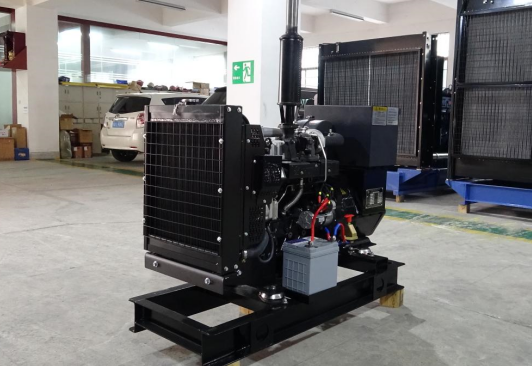dingbo@dieselgeneratortech.com
+86 134 8102 4441

- Home
- Products
- About Us
- Service
- News
- Technical Support
- Contact Us
dingbo@dieselgeneratortech.com
+86 134 8102 4441
Apr. 09, 2024
If you experience frequent power shortages due to extreme weather and your daily routine is often interrupted, it's recommended that you invest in an emergency power generator for home. A home generator can keep your appliances running in a power cut and provide peace of mind. Here's how to choose the right one.
A home emergency power generator is a device that can supply electricity for your home whenever the main power is lost. It is used only during emergency situations, such as power shortages caused by natural disasters.
Typically, this type of generator supply power by converting mechanical energy into electrical energy. An emergency generator usually consists of an engine, an alternator, a voltage regulator, a fuel system and a control panel. Read more about how a diesel generator works.

Emergency generators for home vary widely in terms of size, power capacity, and fuel type. The basic types of these generators include home standby generators, portable generators and inverter generators. The 3 most common fuel sources for the generators are gasoline, diesel and natural gas.
Since generators come in different shapes and sizes, which is the best one for home use? To get a reliable backup power source, you need to take various factors in considerations when buying a home emergency generator. The main factors including:
This is one of the most important considerations when opting for a generator. The output of the generator should be sufficient to power lights and home appliances in the event of a power outage. Thus, you need to determine how much power you need for the necessary appliances during outages. A simple way to figure out your wattage needs is to add up the wattage of the appliances you'll be charging or using during an outage. Bear in mind that items like sump pump and fridges which have an induction motor have a higher starting wattage of three times the running wattage. Find the highest starting wattage among such items and add the figure to the total running watts. Make sure the generator you choose can deal with the combined wattage and supply enough energy to meet your power needs.
The fuel type of the generator is also a key consideration. Gasoline, diesel and natural gas have become established for the operation of home emergency generators. Each option has its own pros and cons. For example, gasoline generators are quieter and cheaper than diesel generators, but they require regular maintenance. Diesel generators are more fuel-efficient and have a longer service life in comparison to gasoline generators, but they are much larger and noisier. In terms of the purchase price, running costs and noise level at different loading conditions as well as running behavior, each fuel type of generator varies. Thus, which generator fuel source is most suitable depends on your preferences and needs.
Portable generators are typically light-weight and affordable. They often have wheels and can be carried around easily. Some models are handled, which are more mobile. However, these generators have a limited output capacity, they can only keep some small appliances like smartphones and lights on during a short-term power cut. Standby generators, also known as whole house generators, can provide reliable power and keep all of your appliances running during extended power outages or in emergency situations. However, they are more expensive and take up of a lot of space to install. You can choose a suitable model as needed.
When generators are used in residential areas, noise level requirements should be considered. Please be noted that an emergency generator more or less will produce a certain amount of noise during operation. To avoid interrupting your neighbors and family members when using the generator, choose a relatively quiet running generator with extra features to reduce the noise.
When buying a home emergency generator, your budget is still a primary consideration. It’s not affordable to purchase a whole-house generator, which can cost $5,000 to $25,000. If cost is an important factor, we suggest you buy a portable generator, which is cheaper than a standby generator.
Emergency generators emit carbon monoxide, which causes a potential for CO poisoning. For the sake of security, you need to ensure proper ventilation for the equipment and avoid running generators in enclosed areas. A generator equipped with a CO shutoff switch can kill the engine if dangerous levels of the poisonous gas are measured.
In addition to the automatic CO shutoff feature, there are other features to look out for in generators, such as fuel gauge, low-oil shutoff, automatic start, etc. Consider which feature is most important to you before buying a generator for home.
In a word, to choose the right emergency generator for home use, you need to consider factors including your wattage needs, fuel type of generator, standby or portable needs, noise level, budget, safety and other features that you may need.
Still unsure about which generator is suitable for you? If you have any questions about how to choose a generator for your house or business, contact Dingbo Power today.
Quicklink
Mob.: +86 134 8102 4441
Tel.: +86 771 5805 269
Fax: +86 771 5805 259
E-mail: dingbo@dieselgeneratortech.com
WhatsApp: +86 134 8102 4441
Add.: No. 10 Kechuang Road, High tech Zone, Nanning, Guangxi, China